環境
TBMでは、多様な事業に多拠点で取り組むメンバーが一丸となって環境への配慮を推進するため、TBM環境方針を掲げています。
環境マネジメント
TBMでは、多様な事業に多拠点で取り組むメンバーが一丸となって環境への配慮を推進するため、環境方針を掲げています。
TBM環境方針
持続可能な社会と豊かな自然環境を将来世代へと引き継いでいくため、TBMは、バリューチェーン上の環境負荷ネットゼロと、事業を通じた環境・社会課題の解決に挑戦し続けます。この方針は、2022年1月14日に取締役会の決議を経て制定されました。
TBM環境方針について詳しくはこちら
この環境方針に則り環境マネジメントシステムを構築し、PDCAサイクルに基づく体系的な環境パフォーマンス向上の取り組みを推進するとともに、事業を通じた環境へのポジティブ・インパクトのさらなる拡大を目指しています。
この環境マネジメントシステムについては、自社運営の生産拠点を含む4拠点(東京本社・テクノロジーセンター・東北LIMEX工場・横須賀サーキュラー工場)で、国際標準化機構(ISO)が定めた国際規格 ISO 14001の要求事項を満たしていることが、認証機関の審査で確認されています。
- 認証の詳細
- ・認証組織名:株式会社TBM
- ・適用規格:環境マネジメントシステム ISO 14001:2015
- ・認証登録日:2024年4月19日
- ・登録範囲:無機・有機複合材料の製造、プラスチック及び無機・有機複合材料のリサイクル、プラスチックスクラップ及び再生プラスチックの販売
- ・認証機関:BSIグループジャパン株式会社
- ・認証登録番号:EMS 803494
- ・認証登録証
製品による環境影響の低減:LCA
TBMで生じる環境影響だけでなくサプライチェーンの上流・下流で生じる環境影響も総合的に理解・低減していくため、製品・サービスのライフサイクル全体またはその特定段階における環境影響を科学的かつ定量的に評価する手法であるライフサイクルアセスメント(LCA)を積極的に活用しています。
2016年に東京大学 生産技術研究所 沖研究室と共同でLCAを実施して以来、2018年から2019年にかけては一般社団法人産業環境管理協会(JEMAI)と共にLIMEX SheetやLIMEX
Pelletを用いた成形品のLCAを実施、2020年からはJEMAIの産業支援部門業務を引き継いだ一般社団法人サステナブル経営推進機構(SuMPO)の協力の下でLCAに取り組んでいます。
開発・製造段階では、このLCAの手法を用いて製品のライフサイクルの各段階での環境負荷を定量化し、製品ごとに環境負荷の特性や改善余地の把握、改善効果の確認などを行っています。
資源・サーキュラーエコノミー
偏在資源への依存度低減
TBMは、世界中に豊富に存在する石灰石を使用したLIMEXを開発・製造・販売することで、地球上の限られた地域でしか採掘されない石油由来のプラスチックの使用量を低減しています。また、2050年までに世界人口の51%が高い水リスクに陥る可能性がある*と言われる中、水の利用量を抑えて製造できるLIMEX
Sheetを提供しています。
*WWF 2020
“Water Risk Filter Brief”
資源循環に向けた取り組み
TBMは、天然資源の枯渇や廃棄物による汚染などの資源利用に伴う環境問題を防止するため、資源循環を推進しています。特に、自社工場での端材の活用には操業開始当初から取り組んでおり、現在ではその多くを原材料として再度活用できるようになりました。
また、使用済みの自社製品や廃プラスチック類のリサイクルにも、事業を通じて取り組んでいます。
気候変動
目標
TBM Pledge 2030 では、Go Carbon Negative(2030年までにカーボンネガティブを実現する)として、下記3つの目標を掲げています。
- TBMからのGHG排出(Scope 1・Scope 2)をゼロにする
- バリューチェーン上のGHG排出(Scope 3)を2020年度比で半減させる
- 社会全体のGHG排出削減に貢献する
TBMの目標は、GHG(温室効果ガス)の排出削減目標達成を推進するために設立された国際的なイニシアチブ「Science Based Targets
initiative(SBTi)」より「1.5℃目標」として認定されています。また、AmazonとGlobal Optimismが共同で立ち上げた「The Climate
Pledge」(気候変動対策に関する誓約)に署名しました。
2024年のTBMからのGHG排出量(Scope 1・Scope 2)は2020年比で73%の削減、バリューチェーン上のGHG排出量(Scope
3)は、生産量や算定範囲の拡大等に伴い、2020年比で474%の増加となりました。 また、2024年のLIMEX製品の販売に伴うGHG排出削減貢献量*は、11,494 t-CO2eqとなりました。
*GHG排出削減貢献量 LIMEX事業と資源循環事業の概算の合計。算出方法は今後変更の可能性があります。
GHG削減の取り組み
TBMは東北LIMEX工場と横須賀サーキュラー工場において実質「100%再生可能エネルギー由来」「CO₂排出係数ゼロ」の電力を使用しています。これにより、両工場の操業に伴うエネルギー起源のCO₂などの温室効果ガスを大幅に削減し、お客さまにご提供しているLIMEX SheetおよびLIMEX PelletのサプライチェーンにおけるGHG排出量の削減に取り組んでいます。
見える化・情報開示
TBMではScope 1・Scope 2・Scope 3のGHG排出量を算定し、サステナビリティレポートにて開示しています。自社の直接排出のみならず、バリューチェーン上の間接排出を特定し、削減に必要な情報の収集に努めています。収集した情報をステークホルダーの皆さまに開示することも重視しています。
ハコベル㈱と連携した輸送に伴うCO₂排出量の算定
輸送に伴うCO₂排出量の算定を、シナリオに基づく推算ではなく、案件ごとの排出量の積み上げによって行うことで正確性を高めるべく、ハコベル㈱と連携して、業務負荷をかけずにCO₂排出量を可視化するためのシステムづくりを推進しました。本取り組みは、公益社団法人日本ロジスティクスシステム協会主催の「2022年度ロジスティクス大賞 特別賞」を受賞しています。
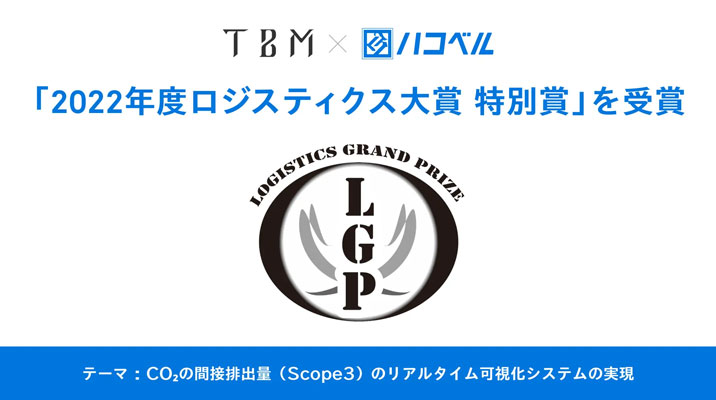
CDPの質問票への回答
国際的なESG情報開示・評価機関であるCDP(旧
カーボン・ディスクロージャー・プロジェクト)の質問票へ、TBMは2017年から自主的に回答を続けています。2024年度は、気候変動:B、水:Bの評価を受けました。
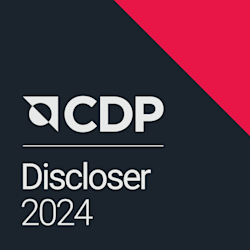
GHG排出量の見える化・削減支援
お客さまからの「GHG排出量の算定・削減を支援してもらいたい」という声にお応えするため、TBMではGHG排出量の見える化と削減を支援するプラットフォーム、ScopeXを運営しています。
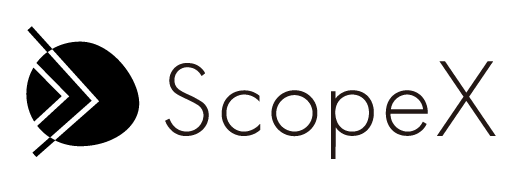
生物多様性・生態系サービス
生分解性を備えたLIMEXの開発
海洋プラスチック汚染への対策方針は国や地域によって異なります。例えば、世界最大のプラスチック使用国である中国*では、生分解性プラスチックの導入を積極的に進めています。
生分解性とは、微生物の働きによって、水とCO₂に分解される性質を指します。TBMは、2021年に韓国大手財閥である
SKグループの化学素材大手SKCと連携してJV(ジョイントベンチャー)「SK TBMGEOSTONE Co., Ltd」を設立
し、生分解性LIMEXの開発・事業化を推進しています。
*OECD 2022
“Global Plastics Outlook: Policy Scenarios to 2060”
海洋プラスチックの活用に向けた取り組み
TBMは、公益財団法人日本財団、一般社団法人日本先端科学技術教育人材研究開発機構(JASTO)、株式会社リバネスが共同実施する産学連携・超異分野での海洋ごみ削減とビジネス創出を目指す「 プロジェクト・イッカク 」の一環として、「海洋漂着ごみ回収バッグ」を作製するなど、海岸への漂着ごみの再資源化に取り組んでいます。公益財団法人ボーイスカウト日本連盟による 「プラごみバスターズ大作戦 アップサイクルミッション」 にも賛同し、牡蠣パイプの再資源化にも取り組んでいます。
海洋漂着ごみ回収バッグ
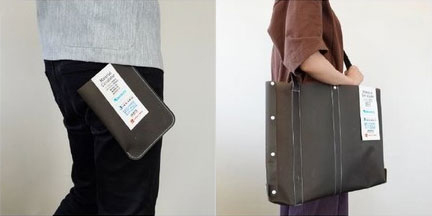
展開すればレジャーシートにもなる
海洋漂着ごみ回収バッグ
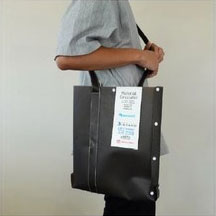
微細なプラスチックごみ
回収用小型ポーチ



